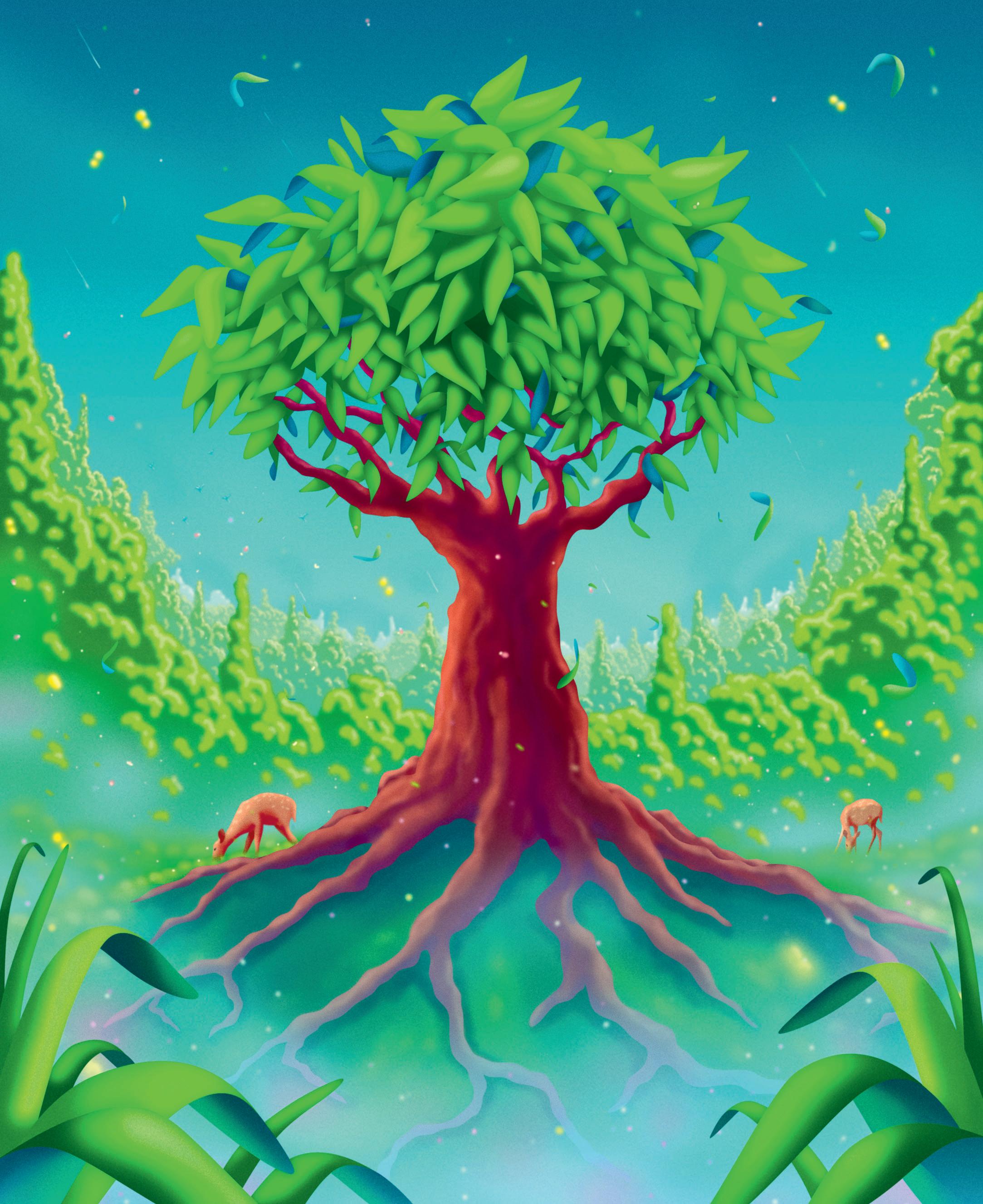
THERE ARE A LOT OF HUMANS. Teeming is perhaps an unkind word, but when 8 billion people cram themselves onto a planet that, three centuries before, held less than a tenth of that number, it seems apt. Eight billion hot-breathed individuals, downloading apps and piling into buses and shoving their plasticky waste into bins - it is a stupefying and occasionally sickening thought.
And yet, humans are not Earth's chief occupants. Trees are. There are 3tn of them, with a collective biomass thousands of times that of humanity. But although they are the preponderant beings on Earth - outnumbering us by nearly 400 to one - they're easy to miss. Show someone a photograph of a forest with a doe peeking out from behind a maple and ask what they see. "A deer," they'll exclaim, as if the green matter occupying most of the frame were mere scenery. "Plant blindness" is the name for this. It describes the many who can distinguish hybrid dog breeds yet cannot identify an apple tree.
Admittedly, trees do not draw our attention. Apart from plopping the occasional fruit upon the head of a pondering physicist, they achieve little that is of narrative interest. They are "sessile" - the botanist's term meaning incapable of locomotion. Books about trees often have a sessile quality, too; they are informative yet aimless affairs, heavy on serenity, light on plot.
Or, at least, they were until recently. The German forester Peter Wohlleben's surprise bestseller, The Hidden Life of Trees (published in English in 2016), has inaugurated a new tree discourse, which sees them not as inert objects but intelligent subjects. Trees have thoughts and desires, Wohlleben writes, and they converse via fungi that connect their roots "like fibre-optic internet cables". The same idea pervades The Overstory, Richard Powers' celebrated 2018 novel, in which a forest scientist upends her field by demonstrating that fungal connections "link trees into gigantic, smart communities".
Esta historia es de la edición May 03, 2024 de The Guardian Weekly.
Comience su prueba gratuita de Magzter GOLD de 7 días para acceder a miles de historias premium seleccionadas y a más de 9,000 revistas y periódicos.
Ya eres suscriptor ? Conectar
Esta historia es de la edición May 03, 2024 de The Guardian Weekly.
Comience su prueba gratuita de Magzter GOLD de 7 días para acceder a miles de historias premium seleccionadas y a más de 9,000 revistas y periódicos.
Ya eres suscriptor? Conectar

No 298 Bean, cabbage and coconut-milk soup
Deep, sweet heat. A soup that soothes and invigorates simultaneously.

Cottage cheese goes viral: in reluctant praise of a food trend
I was asked recently which food trends I think will take over in 2025.

I'm worried that my teenage son is in a toxic relationship
A year ago, our almost 18-year-old son began seeing a girl, who is a year older than him and is his first \"real\" girlfriend.

BOOKS OF THE MONTH
A roundup of the best recent science fiction, fantasy and horror

Dying words
The Nobel prize winner explores the moment of death and beyond in a probing tale of a fisher living in near solitude

Origin story
We homo sapiens evolved and succeeded when other hominins didn't-but now our expansionist drive is threatening the planet

Glad rags to riches
Sarcastic, self-aware and surprisingly sad, the first volume of Cher's extraordinary memoir mixes hard times with the high life

Sail of the century
Anenigmatic nautical radio bulletin first broadcast 100 years ago, the Shipping Forecast has beguiled and inspired poets, pop stars and listeners worldwide

How does it feel?
A Complete Unknown retells Bob Dylan's explosive rise, but it als resonates with today's toxic fame and politics. The creative team expl their process-and wha the singer made of it all
Jane Austen's enduring legacy lies in her relevance as a foil for modern mores
For some, it will be enough merely to re-read Persuasion, and thence to cry yet again at Captain Wentworth's declaration of utmost love for Anne Elliot.